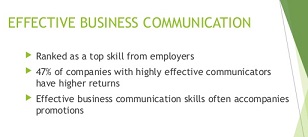Business communications are crucial soft skills throughout the workplace landscape. Whether you’re just starting out in business or are further along in your career curve, there are specific business communication skills necessary for success in any language. What business communication skills and “soft skills” will help you work smarter? Here are 9 communication skills every professional should master.

Active listening skills:
The ability to listen to and incorporate other views in your communication. Listening shows you value opinions outside of your own and are open to new concepts. As a result, your audience views you as an equal partner and you can come to a solution that benefits the greater good. An active listener will allow pauses for interjections, repeat other people’s words and ask questions to affirm his or her engagement in a conversation.
Writing skills:
Using specific data and examples in written communication to make a solid case, and communicating proposed action items. Written communication for business should be brief but informative, and helps an audience focus on only the most important points. Good written communication also includes adequate follow-up, which closes the communication loop and shows proactive activity towards goals
Verbal skills:
The ability to communicate information (ideas, thoughts, opinions and updates) in a clear manner verbally. Like good written communication, good verbal communication in the workplace is also concise and specific (researchers have found that today’s attention span amounts to only 8.25 seconds). Verbal communication allows employees to engage with one another in-person and come to a mutually agreeable consensus.
Interpersonal communication skills:
Building trust and strong relationships with key stakeholders in a business. Another “soft skill,” successful interpersonal communication allows employees to find common ground, display empathy and build bonds with one another. Interpersonal communication means connecting on more than business level, but a personal level as well.
- Teamwork skills: Effectively communicating with others who may have different opinions and skill sets. In a business setting, this means putting aside personal differences and working toward a common goal. For teamwork to be successful, all parties must recognize that combined efforts are worth more than individual contributions.
- Presentation skills: Presenting information and ideas to an audience in a way that is engaging, motivating, and effective (9 Tips on How to Present Well). This method of business communication allows one individual, or a group of individuals, to share evidence to support an idea or argument. A good presenter is also a good storyteller, using data, stories and examples to influence an audience to act toward a desired outcome. (Article: How to Incorporate Storytelling in Your Business Communications)
- Selling skills: Persuading stakeholders to pursue an idea, decision, action, product or service. Selling skills extends beyond just those whose jobs fall under the sales department. Employees with selling skills can use these skills to influence other employees to buy into a project, team members to choose a side, or executives to offer new products or services.
- Negotiation skills: Reaching a mutually beneficial solution by understanding and leveraging the other side’s motivations. A mutually beneficial or “win-win” solution is one that both sides finds favorable, and maintains positive relationships for future interactions. In order to achieve this outcome, you’ll need to discover what factors would be most influential and agreeable for the other side.
- Networking skills: Displaying business value and encouraging others to enter into your business network. In order to network successfully, you’ll need to be interesting enough that others desire to partner with you in some way. A large business network can also be a safety net, and means you have more people to rely on when you require help, information or services.
Don’t feel discouraged if you don’t possess every business communication skill on this list – not many do. As with any changes in one’s habits, mastering skills that aren’t second nature require time, experience, practice and patience. First, identify which of these skills are your weakest, and then create a plan on how to improve these communication skills to work smarter and more effectively. Good luck!

Among these skills, I might find negotiation skills the most difficult to master. Negotiation requires a deep understanding of the other party’s motivations, interests, and possible strategies. It’s challenging to balance the need to achieve a favorable outcome for oneself or one’s team while also ensuring that the other side feels satisfied and that the relationship is maintained. Additionally, being able to quickly analyze the situation, come up with creative solutions, and communicate effectively during the negotiation process is a complex combination of abilities. As for whether any critical business communication skills were missed, one skill that could be added is cross-cultural communication… Read more »
I went through your blog, it’s an excellent blog. It tells us about detailed information about importance and benefits of communication skills training. I recommend this blog and Above Skill, if you want to know more about communication skills training.
thanks for your support
Enjoyed the information…all is relevant to become well rounded in the business world. We now need to incorporate virtual/web conferencing skills.
Great article. Thank you!
This was an amazing article. Thank you
I completely agree with your discussion on how the employer’s communication skills must be perfected or it could end their career. You must create a plan to perfect these skills that you struggle with in order to finally see a change in your skills. Thank you for sharing your post with us!
Very, well said! All these can make or break an employee’s career. However, what about the business itself? It is imperative for companies to equip the employees with the right tool so they can be productive. For instance, keeping business communication in view, using the right audio conferencing tool can make a good impact on the productivity of the business.
I like the part where you talked about identifying your weakest communication skill and then creating a plan on how to improve it. Knowing your weakest skill helps in creating a more specific plan and avoid unnecessary strategies that will only eat your time. One can opt for reading self-help books or attending business communication training to improve your skills.
Hi to every body, it’s my first visit of this weblog; this blog carries awesome and actually excellent
information in favor of readers.
Thank you Lei,
I have 15 years experience as business manager at global US based company. Can you tell me if there is any study which describe the differences between communications skills requirements for different global region. For example between US and Europe and then i.e. between France and Poland? Every country has its own history and social. I observed that there is total different way to communicate in each region.
what about the non verbal skill and also the oral communication
#3 verbal skills refers to the oral communication. As for non-verbal skills, they are also important although not as much as these nine. If your verbal skills are not up to par, then it doesn’t matter as much that non-verbal skills are stellar. Your audience still focuses first on what and how you are saying something before they focus your non-verbal queues like posture, eye contact, etc.. Hope that helps
As someone who runs their own business I have had to really put a lot of time and effort into developing my networking skills, any business I get is organic and comes from making the right contacts. However, part of networking does involve many of the other skills listed here especially your communication skills. I have found some brilliant resources especially from the following which have really helped me develop my approach to networking and generally improved my business etiquette. goo.gl/J9jBiC
thanks for sharing. networking skills are key to both business success and career success.